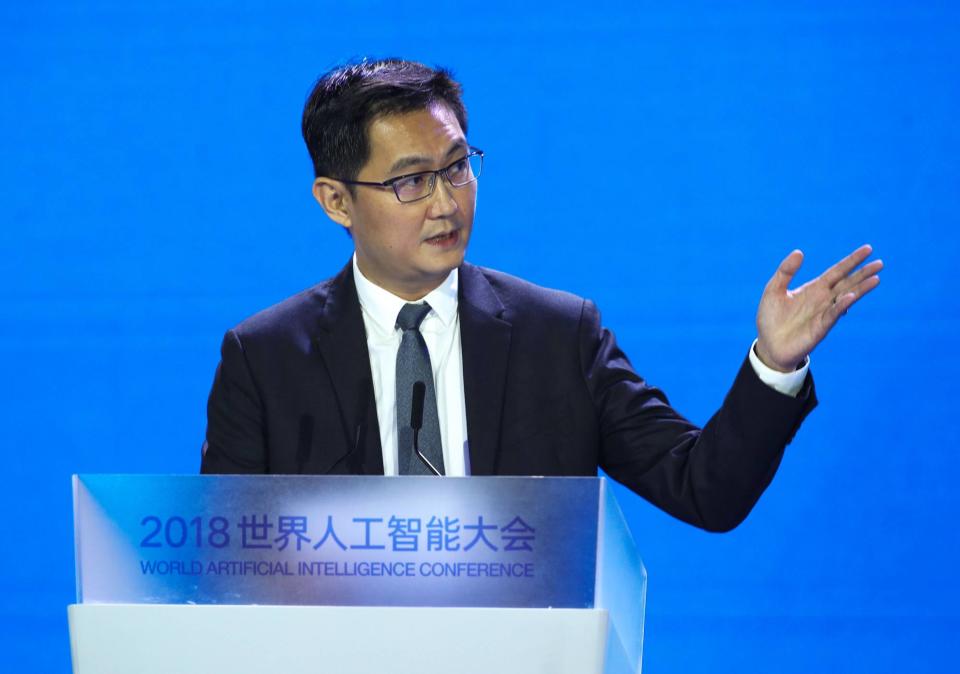How three MIT scientists and Tencent's backing created Hong Kong's new investor darling
A loss-making firm that applies artificial intelligence (AI) to drug research has become a new darling for both old-money and new-money investors in Hong Kong, drawn by the impressive credentials of its three founders, who trained at the Massachusetts Institute of Technology (MIT), as well as the endorsement of Tencent Holdings' billionaire founder Pony Ma Huateng.
Nine-year-old QuantumPharm, which began trading on Thursday, raised nearly HK$1 billion (US$128 million) in an initial public offering (IPO) in Hong Kong, becoming the first technology company to float shares under the city's relaxed regulatory framework known as Chapter 18C.
The Hong Kong stock exchange introduced Chapter 18C a year ago to allow promising start-ups worth at least HK$10 billion to sell shares even before they have made any revenue, as part of the government's efforts to transform the city into a hi-tech hub.
Do you have questions about the biggest topics and trends from around the world? Get the answers with SCMP Knowledge, our new platform of curated content with explainers, FAQs, analyses and infographics brought to you by our award-winning team.
The IPO of Quantum Pharm, known also as XtalPi, has been portrayed as a showcase of Hong Kong's major role in supporting China's "hard technology" drive.
Hong Kong finance chief Paul Chan Mo-po delivered a congratulatory message on the day of the firm's trading debut, saying that the city's advantage as an international financial centre enables it to facilitate technological innovation, a key element in the "new quality productive forces" that President Xi Jinping sees as key to China's development.
QuantumPharm's cornerstone investors include real estate mogul Peter Lee Ka-kit, chairman of Henderson Land Group, as well as MIT chemistry professor Bradley Pentelute, according to the underwriters.
Public investors oversubscribed the offer by 103 times.
Some subscribers were likely dazzled by QuantumPharm's three founding members - Wen Shuhao, Ma Jian and Lai Lipeng - who are all scientists trained at one of the world's most highly regarded research universities.
"Ten years ago, we were three young men at MIT," said Wen, the company's chairman, at the company's listing ceremony on Thursday. The company now brings together "hundreds of PhD degree holders" after "a decade of hard work", he said.
Wen, 42, earned his doctorate in physical chemistry from the Dalian Institute of Chemical Physics of the Chinese Academy of Sciences in 2010 and went on to work as a postdoctoral associate at MIT from 2013 to 2015.
There, he met future business partners Ma, a quantum computing scientist and now CEO at QuantumPharm, and Lai, who holds a PhD in Physics from Chicago University.
By combining their expertise, the Shenzhen-based company is trying to use quantum physics, artificial intelligence and robotics to significantly shorten the time needed to develop and test new medicine. One of QuantumPharm's claimed achievements is that its technology helped reduce the development cycle of Pfizer's Paxlovid, the first Covid-19 oral treatment, to six weeks.

Pony Ma Huateng, founder of Tencent. Photo: STR/AFP alt=Pony Ma Huateng, founder of Tencent. Photo: STR/AFP>
QuantumPharm's pitch was impressive enough to win the attention of Tencent's Ma, whom Wen said he met in 2016. While Ma said at the time that the social media and video gaming giant, also based in Shenzhen, seldom invested in pharmaceutical ventures, he decided to bet on the start-up because of its potential "social value".
Tencent, China's highest-valued tech giant and a key investor in QuantumPharm, has put about US$1 billion into the company as of June 2023, according to the start-up's prospectus. Tencent holds 13 per cent of QuantumPharm's shares after the IPO.
"The company that creates the greatest social value can create the greatest business value," Wen said.
But for now, QuantumPharm still needs to prove its commercial value.
The company's losses widened 19 per cent to 522 million yuan (US$72 million) last year, dwarfing its revenue of 174 million yuan, mostly due to its heavy research expenditure.
Shares of the company closed at HK$5.4 on Friday, down 6.9 per cent and wiping out most of its gains since Thursday amid a broader slip in the Hong Kong market.
QuantumPharm has "generated initial excitement and optimism among investors" in Hong Kong, but it has to prove to investors that it can make profits, said Dickie Wong, executive director at local brokerage Kingston Securities.
This article originally appeared in the South China Morning Post (SCMP), the most authoritative voice reporting on China and Asia for more than a century. For more SCMP stories, please explore the SCMP app or visit the SCMP's Facebook and Twitter pages. Copyright © 2024 South China Morning Post Publishers Ltd. All rights reserved.
Copyright (c) 2024. South China Morning Post Publishers Ltd. All rights reserved.

 雅虎香港財經
雅虎香港財經 